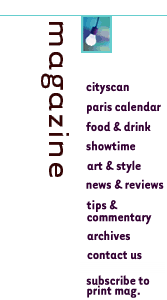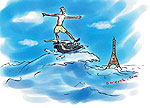One of the great clichés of the 20th century hovered around the glory of being an expat writer in Paris. The glory wasn’t always so glorious but retrospectively there were a few fine moments in the literary history of the place, and those gilded episodes will never be tarnished by time. We remember The Twenties, The Fifties, The Eighties. In fact, we all kind of scoffed at the slogan that an LA Times correspondent coined in the days when the Village Voice Bookshop, the Paris Free Voice, Paris Exiles, Passion Magazine, Sphinx, Moving Letters and the literary journal Frank emerged: “The Third Wave,” she called it, as if every 30 years creative anglophones experience a new heyday. We shouldn’t be too astounded then that the Fourth Wave is now washing up on the banks of the Seine in this first decade of the 21st century. Parisian history, like history in general, is cyclical.
In the 20 years that I’ve been around this city, the term expatriate has always been confusing. The sense of protest, rejection and creative abandon that drove the messy but accomplished lives and manuscripts of the Lost Generation — and then the postwar Americans — seemed to have faded away. I love citing the fact that even AT&T, that once powerful symbol of established corporate America, adopted the term to identify its overseas customers regardless of their bank books or political persuasions. The International Herald Tribune has recently launched a new monthly feature called At Home Abroad. We’re a profiled identity, and our eyeballs and credit cards are coveted whether or not you voted for Ralph Nader or owned a lot of Enron stock.
The Third Wave of course had a lot to do with the strength of the dollar. At 11 francs for each greenback, it was suddenly the right time to put your stuff in storage, take a leave of absence, and transform that dream into a reality. I think the mood of the Reagan years also played its part. Intellectuals — that means writers and artists to a certain degree — found themselves less relevant in a market economy, especially with that stunningly smooth minor actor running the set. And, the cultural identity of the country appropriately seemed to become a B-movie in itself. Off to Paris it was.
Now, suddenly thrust in the Fourth Wave, post-September 11... The term patriot has taken on a new and skewered meaning, requiring almost by definition that expatriates change too. Whether or not you liked Bill Clinton’s politics or approved of his personality, it was incontestable that the power elite of the country had moved into a new generation. The æsthetics and language of our government and business leaders had caught up with us. Hell, the president of the United States was playing the saxophone on MTV! The alienation of identity sloughed off, and it didn’t make a great deal of difference if you were hanging out in the Latin Quarter, Greenwich Village, Silicon Valley, or downtown Austin.
Now, the expat writer in Paris finds himself or herself at odds with the homeland, because the ambient dialog is vastly different in the two places. Last week, a writer friend told me that his two closest college buddies — of 40 years — stopped talking to him. One emailed him expressing an intense anger that anyone who has left the country no longer had the right to question anything American, from McDonalds to George W. Bush. Yet, one of the greatest gifts that the last six months has given to expatriate Americans is distance, the immunity needed to remain at least somewhat objective. If writers can not ask questions, they cannot not be writers. And a society where the writers are mute is seriously in trouble.
The reality is that a constant flow of individuals who write novels and poems continue to arrive in Paris. Not knowing yet what the anonymity of foreigness offers, some benefit from that very naïveté. Others realize that pain of trying to create in a world that offers less support. Fortunately, below the surface of political disruption, the deeper cultural difference of living in France and leading a writerly life continues to nourish literary innovation in the narrative, in its multitude of new and sometimes digital heads.
david@paris-anglo.com
A long-time Paris resident, David Applefield is the author of two novels — Once Removed (1997) and On a Flying Fish (forthcoming, 2002), — as well as the editor of popular guidebooks Paris Inside Out (2000), and The Unofficial Guide to Paris (2001). He publishes the literary journal FRANK (www.ReadFrank.com) and the free Paris newsletter “My Mercredi” at www.paris-anglo.com




